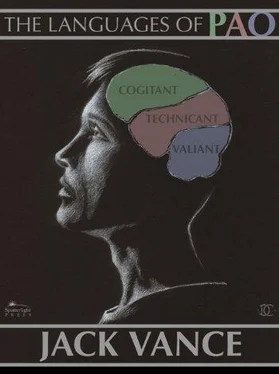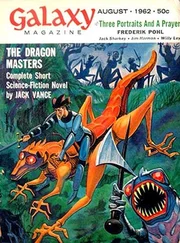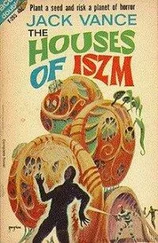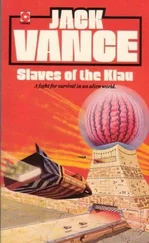Finisterle, likewise, had risen to leave. He lifted his eyebrows in polite surprise when Beran spoke to him. “You have a question, Student Paraio?”
“I want to know what you plan toward me. Why don’t you report me to Palafox?”
Finisterle made no pretense of incomprehension. “The fact that as Beran Panasper you attend the Institute, and as Ercole Paraio you study languages with the Paonese? What should I plan, why should I report you?”
“I don’t know. I wonder if you will.”
“I cannot understand how your conduct affects me.”
“You must know I am here as ward of Lord Palafox.”
“Oh indeed. But I have no mandate to guard his interests. Even,” he added delicately, “if I desired to do so.”
Beran looked his surprise. Finisterle went on in a soft voice. “You are Paonese; you do not understand us of Breakness. We are total individuals—each has his private goal. The Paonese word ‘co-operation’ has no counterpart on Breakness. How would I advance myself by monitoring your case to Sire Palafox? Such an act is irreversible. I commit myself without perceptible advantage. If I say nothing, I have alternate channels always open.”
Beran stammered, “Do I understand then, that you do not intend to report me?”
Finisterle nodded. “Not unless it reacts to my advantage. And this I can not envision at the moment.”
A year passed—a year of anxiety, inward triumph, carefully stifled hope; a year of artifice, of intense study in which the necessity to learn seemed to kindle the powers of learning; a year during which Beran Panasper, the Paonese exile, was an attentive if irregular student at the Institute and Ercole Paraio, the Paonese apprentice linguist, made swift progress in three new languages: Valiant, Technicant and Cogitant.
To Beran’s surprise and to his great advantage, Cogitant proved to be the language of Breakness, modified considerably against the solipsism latent in the original tongue.
Beran thought it best not to display ignorance of current conditions on Pao, and restrained his questions. Nevertheless, by circuitous methods, he learned much of what was transpiring on Pao.
On sections of two continents, the Hylanth Littoral of Shraimand, and along the shores of Zelambre Bay on the north coast of Vidamand, dispossession, violence and the misery of refugee camps still continued. No one knew definitely the scope of Bustamonte’s plans—no doubt as Bustamonte intended. In both areas, the original population had been and were being disestablished, while the enclave of new speech expanded, a tide pressing against the retreating shores of the old Paonese customs. The areas affected were still comparatively small, and the new populations very young: children in the first and second octads of life, guided by a sparse cadre of linguists who under pain of death spoke only the new language.
In subdued voices the apprentices recalled scenes of anguish: the absolute passive obduracy of the population, even in the face of starvation; the reprisals, effected with true Paonese disregard for the individual life.
In other respects Bustamonte had proved himself a capable ruler. Prices were stable, the civil service was reasonably efficient. His personal scale of living was splendid enough to gratify the Paonese love of pomp, but not so extravagantly magnificent as to bankrupt the treasury. Only on Shraimand and Vidamand was there real dissatisfaction—and here of course dissatisfaction was a mild word for the sullen rancor, the pain and grief.
Of the infant societies which in due course would expand across the vacated lands, little was known and Beran found it hard to distinguish between speculation and fact.
A person born to the Paonese tradition inherited insensitivity toward human suffering—not so much callousness as an intuition of fate. Pao was a world of vast numbers and cataclysm automatically affected great masses of people. A Paonese hence might be touched by the plight of a bird with a broken wing, even as he ignored news of ten thousand drowning in a tidal wave.
Beran’s Paonese endowment had been modified by his education; for no one could regard the population of Breakness as anything other than a set of discrete units. Perhaps for this reason he was moved by the woe of Shraimand and Vidamand. Hate, an element hitherto foreign to his nature, began to find a place in his mind. Bustamonte, Palafox—these men had vast horrors to answer for!
The year moved to its completion. Beran, through a combination of natural intelligence, zeal and his prior knowledge of the Breakness language, achieved a creditable record as apprentice linguist, and likewise sustained something of his previous program. In effect Beran lived two distinct existences, each insulated from the other. His old life, as student at Breakness Institute, offered no problem, since no one spent an iota of attention on any but his own problems.
As an apprentice linguist, the situation was more difficult. His fellow students were Paonese, gregarious and inquisitive, and Beran won a reputation for eccentricity, for he had neither time nor inclination to join the spare time recreations.
In a jocular moment the students contrived a bastard mish-mash of a language, assembled from scraps of Paonese, Cogitant, Valiant, Technicant, Mercantil and Batch, with a syncretic syntax and heterogeneous vocabulary. This patchwork tongue was known as Pastiche.
The students vied in fluency and used it to the disapproval of the instructors, who felt that the effort might better be spent in their studies. The students, referring to the Valiants, the Technicants and the Cogitants, argued that in all logic and consistency the Interpreters should likewise speak a characteristic tongue—so why not Pastiche?
The instructors agreed in principle, but objected to Pastiche as a formless mélange, a hodge-podge without style or dignity. The students were unconcerned, but nevertheless made amused attempts to contrive style and dignity for their creation.
Beran mastered Pastiche with the others, but took no part in its formulation. With other demands on his attention, he had small energy for linguistic recreations. And ever as the time of return to Pao drew near, Beran’s nerves tautened, and his fear of apprehension increased. A year of hope blasted; how could he bear it?
One month remained, then a week, and the linguists spoke of nothing but Pao. Beran remained apart from the others, pale and anxious, gnawing his lips.
He met Finisterle in one of the dark corridors, and stopped short. Would Finisterle, now reminded, report him; would Finisterle set at nought his work of an entire year? But Finisterle walked past, gaze fixed on some inner image.
Four days, three days, two days—and then during the final recitations the instructor exploded a bombshell. The shock came with such sudden devastation that Beran was frozen in his seat and a pink fog blurred his vision.
“… you will now hear the eminent Dominie who initiated the program. He will explain the scope of your work, the responsibilities that are yours. Here is Lord Palafox.”
Palafox strode into the room, looking neither right nor left. Beran crouched helplessly in his seat, a rabbit hoping to evade the notice of an eagle.
Palafox bowed formally to the class, making a casual survey of faces. Beran sat with head ducked behind the youth ahead; Palafox’s eyes did not linger in his direction.
“I have followed your progress,” said Palafox. “You have done creditably. Your presence here on Breakness was frankly an experiment, and your achievements have been compared to the work of similar groups studying on Pao. Apparently the Breakness atmosphere is a stimulus—your work has been appreciably superior. I understand that you have even evolved a characteristic language of your own—Pastiche.” He smiled indulgently. “It is an ingenious idea, and though the tongue lacks elegance, a real achievement.
Читать дальше







